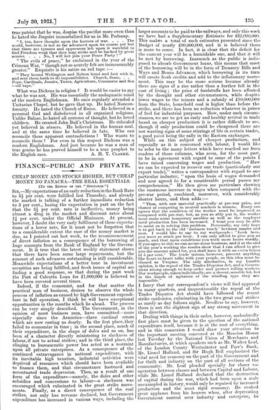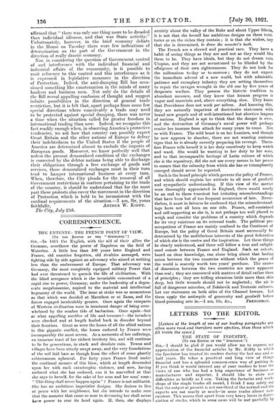FINANCE—PUBLIC AND PRIVATE.
CHEAP MONEY AND STOCKS HIGHER, BUT CHEAP MONEY NO PANACEA—THE REAL ESSENTIALS.
[To THE EDITOR OF THE " SPECTATOR."
Sin,—My expectations of an early reduction in the Bank Rate to 5. per cent. were fulfilled last Thursday, and already the market is talking of a further immediate reduction to 5 per cent., basing the expectation in part on the fact that the 5i per cent, rate is ineffective, money being almost a drug in the market and discount rates about per cent. under the Official Minimum. At present, however, I doubt the very early fulfilment of these expecta- tions of a lower rate, for it must not be forgotten that to a considerable extent the ease of the money market is due, as I pointed out last week, to the recommencement of direct inflation as a consequence of the borrowing of huge amounts from the Bank of England by the Govern- ment. It is true that the latest weekly statement shows that there have been some large repayments, but the amount of such advances outstanding is still considerable. Meanwhile expectations of a better tone in investment securities are being fulfilled, and fresh issues of capital are finding a good response, so that during the past week the Port of Calcutta Loan for £1,000,000 is believed to have been covered several times.
Indeed, if the economist, and for that matter the practical man of business, desires to observe the whole process of inflation as caused by high Government expendi- ture in full operation, I think he will have exceptional opportunities in the months which lie ahead. The process can be very simply described. The Government, in the opinion of most bu.siness men, have committed—more especially since the Armistice—three cardinal errors which are now costing us dearly. In the first place, they failed to economize in time ; in the second place, much of their expenditure, in the shape of doles and so on, has been of a character directly ministering to slackness of labour, if not to actual strikes ; and in the third place, the clinging to bureaucratic rower has acted as a restraint upon all private enterprises. As a consequence of the continued extravagance in national expenditure, with its inevitable high taxation, industrial activities were deprived of resources which should have been available to finance them, and that circumstance hastened and accentuated trade depression. Then, as a result of one form of the expenditure—namely, the doles and other subsidies and concessions to labour—a slackness was encouraged which culminated in the great strike move- ments. Finally, as a direct consequence of the coal strikes, not only has revenue declined, but Government expenditure has increased in various ways, including the larger amounts to be paid to the railways, and only this week we have had a Supplementary Estimate for £62,000,000. This makes a total of such estimates presented since the Budget of nearly £90,000,000, and it is believed there is more to come. In fact, it is clear that the deficit for the current year will be a formidable one, and that it will be met by borrowing. Inasmuch as the public is indis- posed to absorb Government loans, this means that most of the borrowing will be in the form of Treasury Bills and Ways and Means Advances, which borrowing in its turn will create fresh credits and add to the inflationary move- ment. This may be the more serious because already there are signs of a rise rather than a further fall in the cost of living ; the price of foodstuffs has been affected by the drought and other circumstances, while despite lower wages to the miners and a subsidy of /10,000,000 from the State, household coal is higher than before the strike, and there has been no reduction whatever in prioes of fuel for industrial purposes. How, under such circum- stances, we are to get an early and healthy revival in trade based on cheaper production it is rather difficult to see, though if only production could be cheapened there are not wanting signs of some stirrings of life in certain trades, a good point being the rally in the Eastern exchanges. While on this subject of cheaper production, and especially as it is concerned with labour, I would like to refer to the many letters which have reached me from readers of these columns, who seem, for the most part, to be in agreement with regard to some of the points I have raised concerning wages and production. "How we can be expected to recover our trade (particularly our export trade)," writes a correspondent with regard to one particular industry, "upon the basis of wages demanded and now agreed to for a considerable period passes my comprehension." He then gives me particulars showing the enormous increase in wages when compared with the pre-war period, combined, moreover, with considerably shorter hours, and then adds :- "Thus, with raw material practically at pro-war price, our chance of competing in neutral markets is remote. Every ono agrees that the condition of the worker must be improved as compared with pre-war, but, as you so ably put it, the worker must make some temporary sacrifice as well as the employer until production has boon increased. I trust you may be able to assist us in solving this problem. Personally, my only hope is to got back to tho old 'intimate touch' between master and man. I would like to say to my workpeoplo : Look here, you want so much per hour. I can only afford to give you so much, and that upon conditions you work more hours weekly. If you agree to this we can secure some business, and if at the end of the year's working the results show that I can afford to give you the amount asked for, you shall have it with an extra bonus of 5 per cont.' The trade unions, however, prevent anything like heart-to-heart talks with your people, so this idea must be classed as Utopian. The only alternative, in my humble opinion, is the repeal of the Trades Disputes Act, and a Govern- ment strong enough to keep order and protect willing workers. Our workpeople, taken individually, are a decent, sensible lot, but in the hands of agitators of the windbag typo they are impossible."
I fancy that my correspondent's views will find approval in many quarters, and unquestionably the repeal of the Trades Disputes Act should have followed the recent strike epidemics, culminating in the two great coal strikes as surely as day follows night. Needless to say, however, there is not the slightest sign of any strong movement in that direction.
Dealing with things in their order, however, undoubtedly first place must be given to the question of the national expenditure itself, because it is at the root of everything, and in this connexion I would draw your attention to the important meeting convened at the Mansion House last Tuesday by the National Union of Merchants and Manufacturers, at which speakers such as Mr. Walter Leaf, of the London County Westminster and Parr's Bank, Mr. Lionel Holland, and Sir Hugh Bell emphasized the vital need for economy on the part of the Government and for thrift and industry on the part of all sections of the community. Mr. Leaf pleaded specially for closer co- operation between classes and between Capital and Labour, while Mr. Lionel Holland declared that the destruction of capital during the war, which had been upon a scale unexampled in history, would only be repaired by increased production and the most rigid economy. He evoked great applause from his hearers when, after deprecating Government control over industry and enterprise, he affirmed that " there was only one thing more to be dreaded than individual idleness, and that was State activity." Unfortunately, however, in the brief economy debate in the House on Tuesday there were few indications of determination on the part of the Government in the direction of really drastic economy. Nor, in considering the question of Government control of and interference with the individual financial and industrial affairs of the community, is it possible to omit reference to this control and this interference as it is expressed in legislative measures in the direction of Protection. Indeed, the anti-dumping Bill has occa- sioned something like consternation in the minds of many bankers and business men. Not only do the details of the Bill reveal appalling confusion of thought and suggest infinite possibilities in the direction of general trade restriction, but it is felt that, apart perhaps from some few special directions where conceivably a trade may need to be protected against special dumping, there was never a time when the situation called for greater freedom in international trading than now. Indeed, we recognize this fact readily enough when, in observing America's protective tendencies, we ask how that country can possibly expect Great Britain and the other nations of Europe to defray their indebtedness to the United States if the people of America are determined almost to exclude the imports of European goods. Moreover, we know perfectly well that unless the present demoralized condition of the exchanges is corrected by the debtor nations being able to discharge their obligations through a free exchange of goods and services, those demoralized exchanges must in their turn tend to hamper international business at every turn. When, therefore, the City pleads for the removal of all Government restrictions in matters pertaining to the trade of the country, it should be understood that for the most part these protests also cover the movement in the direction of Protection which is held to be inconsistent with the cardinal requirements of the situation.—I am, Sir, yours



































 Previous page
Previous page